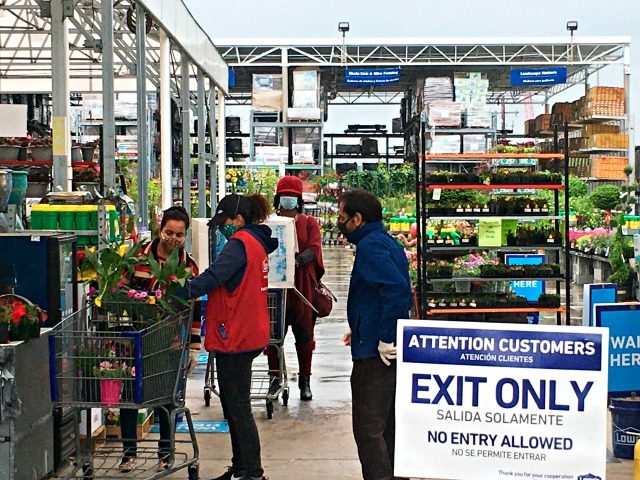All states in America had begun a phased reopening of their economies as of Wednesday after shutting down non-essential businesses to stem the spread of COVID-19, the illness associated with the novel coronavirus.
Although lockdown orders remain in effect in a handful of states as well as the nation’s capital and the U.S. territory of Puerto Rico, some non-essential businesses in those regions have reopened, data compiled by the New York Times revealed as of Wednesday afternoon, echoing other analyses.
Still, Democrat-allied mainstream media outlets like the Times argue that it is premature for states to reopen at this juncture, despite some metrics, like hospitalizations, showing improvements in the coronavirus situation across the United States.
While some health experts have acknowledged that deaths and cases may increase with the reopening of the country as more people go outside their homes, others warn about the potentially lethal costs of keeping the shutdown in place.
Testing has also improved in recent weeks, which will lead to health officials detecting more cases.
Several states (8) did not impose a shutdown. The vast majority of the remaining ones have allowed their shelter-in-place order to expire, either already or by next week (35).
Puerto Rico’s stay-at-home order will expire next week on May 25. Meanwhile, the District of Columbia has extended its quarantine order to June 8.
Some states may choose to extend their quarantine orders after they expire or cut them short if conditions improve.
On Tuesday, U.S. Treasury Secretary Steven Mnuchin warned a Senate panel about the devastation long-term shutdown measures can have on the American economy.
“There is [a] risk of permanent damage,” he told the Senate Banking Committee.
Echoing other health experts, Dr. Francis Collins, the director of the National Institutes of Health (NIH), cautioned in April that there is a clear and present danger that lockdown measures may fuel mental health issues like suicides.
“Particularly with suicide, one worries about the people who already are struggling with depression, and then are put in a circumstance of being isolated from others,” Dr. Collins told the medical news site STAT. “That’s exactly the wrong thing.”
“So that’s one more reason why we need to figure out [the health consequences of the lockdowns] in a safe way, and an evidence-based way how we can get ourselves back out there again because people are suffering with this,” he added.
President Donald Trump has acknowledged there is a real health cost to keeping people cooped up in their homes for long periods.
The Trump administration has provided guidelines for states to reopen. President Trump, however, has left it up to the states to decide when and how.

COMMENTS
Please let us know if you're having issues with commenting.